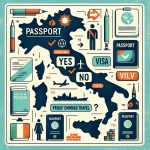Italy, known for its rich history, artistic treasures, and delicious cuisine, attracts millions of travelers each year. However, for those planning a trip to this European destination, there are certain entry requirements and visa regulations to consider.
One of the essential aspects to understand before visiting Italy is the proof of onward travel requirement. This article aims to provide valuable insights into whether Italy requires proof of onward travel and what travelers need to know about this important aspect of their journey.
When planning international travel, one common question that may arise is, “Does Italy require proof of onward travel?” Understanding this requirement is crucial for individuals considering a visit to the country. In this introductory section and throughout the article, we will delve into the concept of proof of onward travel and its significance for travelers heading to Italy.
In the following sections, we will explore what constitutes proof of onward travel and why it is important for meeting Italy’s immigration policy. Additionally, we will discuss whether travelers indeed need proof of onward travel when entering Italy and examine any exceptions or alternatives available.
This comprehensive guide will also address potential consequences at immigration for those who do not have adequate documentation as well as provide practical tips for meeting the proof of onward travel requirement when traveling to Italy. So, let’s unravel the intricacies surrounding this essential aspect of visiting Italy.
What Is Proof of Onward Travel
Proof of onward travel is a requirement that is common among many countries, including Italy. It refers to the documentation or evidence that demonstrates a traveler’s intention to leave the country by a certain date, typically in the form of a return or onward ticket.
This requirement serves as a way for immigration authorities to ensure that visitors do not overstay their permitted period of stay and comply with visa regulations. Understanding this concept is crucial for anyone planning to travel to Italy, as failing to meet this requirement can lead to potential issues at immigration.
Importance of Proof of Onward Travel
The importance of proof of onward travel lies in its function as a means of compliance with Italy’s immigration policy. By presenting evidence of intending to leave the country within the stipulated period, travelers demonstrate their respect for visa regulations and their willingness to abide by the conditions set forth by Italian authorities.
Additionally, having proof of onward travel can also serve as a demonstration of financial responsibility and stability, further enhancing the traveler’s credibility in the eyes of immigration officials.
Forms of Acceptable Proof
While a return airline ticket is the most straightforward form of proof of onward travel, other forms may also be accepted by Italian immigration authorities. These can include bus or train tickets out of the country, cruise reservations, or any other verifiable documentation that indicates the traveler’s planned departure from Italy. It is important for travelers to ensure that their chosen form of proof clearly shows their intended exit date and adheres to Italian visa requirements.
Italy’s Immigration Policy
Italy, known for its rich history, stunning landscapes, and delicious cuisine, is a popular destination for travelers from around the world. However, before planning a trip to Italy, it is essential to understand the country’s immigration policy, entry requirements, and visa regulations. This section will provide an overview of what travelers need to know before embarking on their Italian adventure.
When traveling to Italy, most visitors are required to have a valid passport that remains valid for at least three months beyond the intended departure date from the Schengen area. Additionally, depending on the traveler’s nationality and the purpose of their visit, they may be required to obtain a visa prior to arrival in Italy. It is crucial to research and understand specific visa requirements based on individual circumstances.
For citizens of certain countries, Italy does require proof of onward travel as part of its immigration policy. This means that travelers must have a return ticket or evidence of alternative transportation out of the country before they are allowed entry. Proof of onward travel helps border officials confirm that visitors do not intend to stay in Italy indefinitely without proper authorization. Failure to provide proof of onward travel can result in denial of entry into the country.
In order to avoid any issues with Italian immigration authorities, travelers should ensure that they have all necessary documentation ready before their trip. This includes having a valid passport, obtaining the appropriate visa if required, and being prepared to present proof of onward travel upon arrival in Italy.
| Requirement | Description |
|---|---|
| Passport Validity | Passport must remain valid for at least three months beyond intended departure from Schengen area |
| Visa Requirements | Dependent on traveler’s nationality and purpose of visit; some may need a visa prior to arrival |
| Proof of Onward Travel | Required for citizens of certain countries as part of Italy’s immigration policy |
Do Travelers Need Proof of Onward Travel for Italy
Proof of Onward Travel Requirement
When planning a trip to Italy, one important consideration for travelers is whether they need to provide proof of onward travel. This requirement refers to the necessity of having a ticket or documentation showing that you have plans to leave Italy and continue your journey to another destination. While this may seem like an additional hurdle for travelers, it is actually a common practice in various countries, including Italy.
Understanding the Specific Requirement
Italy, like many other countries, has implemented the proof of onward travel requirement as a means of ensuring that visitors do not intend to overstay their allowed duration in the country. This measure helps immigration authorities verify that individuals entering Italy have clear intentions for their visit and comply with visa regulations. Without proof of onward travel, travelers may raise suspicion regarding their motives for entering the country.
Does Italy Require Proof of Onward Travel?
Yes, Italy does require proof of onward travel for visitors arriving in the country. Whether you are traveling for tourism, business, or any other purpose, having evidence of your plans to depart Italy is essential. This can be in the form of a return airline ticket, train reservation to another European destination, or any other document demonstrating your intention to leave Italy within the authorized period.
Failure to present proof of onward travel could result in entry denial or further questioning by immigration officials. Therefore, it is crucial for travelers to prepare accordingly and ensure they have the necessary documentation before arriving in Italy.
Exceptions and Alternatives
Italy’s immigration policy is designed to ensure that travelers entering the country have the means to leave at the end of their authorized stay. One of the ways this is enforced is through the requirement for proof of onward travel. This means that individuals seeking entry into Italy may be asked to provide evidence that they have a ticket or reservation for a departing flight, bus, train, or other mode of transportation out of the country.
For many travelers, having proof of onward travel is a straightforward process. They simply book a return ticket or make arrangements for onward travel before their authorized stay in Italy comes to an end. However, there are situations where travelers may not have a definitive plan for leaving Italy, whether it’s due to flexible travel itineraries, open-ended journeys, or other reasons.
In such cases where travelers do not have proof of onward travel, there are alternatives and exceptions that may apply. For example, individuals who are entering Italy as part of a round-trip journey but haven’t finalized their departure date from the country could provide evidence of their return trip as an alternative to onward travel documentation. Additionally, travelers who hold valid visas or residence permits for Italy may also be exempt from the proof of onward travel requirement.
| Category | Details |
|---|---|
| Proof of Onward Travel Requirement | Ticket or reservation for departing flight/transportation |
| Alternatives | Evidence of round-trip journey or valid visa/residence permit |
It’s important for travelers without proof of onward travel to be aware of these exceptions and alternatives in order to navigate immigration requirements effectively. By understanding the options available and planning accordingly, travelers can ensure a smooth entry into Italy without facing issues related to the proof of onward travel requirement.
Consequences of Not Having Proof of Onward Travel
When traveling to Italy, it is important for visitors to familiarize themselves with the country’s immigration policies and entry requirements. One specific requirement that often raises concerns among travelers is the need to provide proof of onward travel.
This requirement essentially means that individuals entering Italy must have a confirmed ticket or travel itinerary that demonstrates their intention to leave the country before their visa expires. Failure to comply with this requirement can lead to potential issues at immigration, ultimately affecting a traveler’s ability to enter Italy.
To address the potential consequences of not having proof of onward travel, it is crucial for travelers to understand the importance of this requirement and take proactive measures to meet it. Without providing evidence of a planned departure from Italy, individuals may be subjected to additional scrutiny by immigration officials. In some cases, travelers without proof of onward travel may be denied entry into the country altogether.
Here are some potential issues that travelers may face if they do not have proof of onward travel:
1. Denied Entry: Immigration officials have the authority to deny entry to individuals who cannot demonstrate their intention to leave Italy within the authorized period.
2. Additional Documentation Requests: Travelers without proof of onward travel may be asked to provide other forms of documentation, such as financial evidence or accommodation bookings, to support their case for entry.
3. Deportation: In extreme cases, individuals who cannot satisfy the requirement for proof of onward travel may face deportation from Italy.
To avoid these potential issues, travelers should take proactive steps to ensure they have appropriate documentation demonstrating their plans to leave Italy before their visa expires. This might include securing a return ticket or having a confirmed itinerary for onward travel within the specified timeframe. By being prepared and meeting this requirement, travelers can minimize the risk of facing complications at immigration when arriving in Italy.
Overall, understanding and complying with Italy’s proof of onward travel requirement is essential for smooth entry into the country and enjoyable travels within its borders.
Tips for Meeting the Proof of Onward Travel Requirement
When traveling to Italy, it is important to be aware of the requirements for proof of onward travel. While some countries do not require this documentation, Italy does have specific regulations in place for incoming travelers. Here are some practical tips for meeting the proof of onward travel requirement when visiting Italy.
Book a Flexible Ticket
When planning your trip to Italy, consider booking a flexible ticket that allows for changes to your travel dates if needed. This can provide peace of mind in case immigration officials request proof of onward travel, as you will have the option to adjust your plans if necessary.
Bring Confirmation of Accommodation
Alongside your onward travel ticket, it can be helpful to have confirmation of accommodation bookings within Italy. This shows immigration authorities that you have a planned place to stay during your visit and may contribute positively to meeting the proof of onward travel requirement.
Research Visa Requirements
Before traveling to Italy, thoroughly research the visa requirements for your specific nationality and travel circumstances. Depending on your country of origin and the purpose of your visit, different rules may apply regarding proof of onward travel.
By taking these practical steps and being prepared with the necessary documentation, travelers can ensure that they meet Italy’s proof of onward travel requirement and enjoy a smooth entry into the country without any issues at immigration checkpoints.
Conclusion
In conclusion, it is essential for travelers to understand and comply with Italy’s proof of onward travel requirement in order to avoid potential issues at immigration. While the specific details of this requirement may vary depending on the traveler’s nationality and individual circumstances, it is important to be aware of the potential consequences of not having proof of onward travel when entering Italy.
Travelers should take the time to familiarize themselves with Italy’s immigration policy and visa regulations to ensure that they have the necessary documentation to meet the proof of onward travel requirement. Additionally, exploring alternative options such as purchasing a refundable ticket or obtaining a visa that exempts the traveler from this requirement can provide peace of mind and alleviate any concerns about compliance.
Ultimately, being prepared for travel to Italy means taking proactive steps to meet all entry requirements and avoid any disruptions or complications upon arrival. By understanding the proof of onward travel requirement and planning accordingly, travelers can focus on enjoying their experience in Italy without any unnecessary stress or inconvenience.
In summary, while navigating entry requirements for international travel can sometimes be daunting, being well-informed and prepared can make all the difference in ensuring a smooth and enjoyable trip to Italy. As such, travelers should prioritize compliance with Italy’s proof of onward travel requirement as an integral part of their travel preparations.
Frequently Asked Questions
Do You Need a Return Flight to Enter Italy?
Yes, a return flight is typically required to enter Italy. Visitors are usually asked to provide proof of onward travel, which can include a return flight to their home country or another destination.
What Do Americans Need to Enter Italy?
Americans need a valid passport to enter Italy. The passport must be valid for at least three months beyond the planned date of departure from the Schengen area. Additionally, U.S. citizens can visit Italy for up to 90 days for tourism or business purposes without a visa.
Is Proof of Onward Travel Required?
Proof of onward travel is often required when entering Italy. This means that visitors may need to show proof of a return flight or another form of transportation out of the country in order to be granted entry by immigration authorities at the border or airport security.

I’m a passionate traveler, writer, and Italophile. My fascination with Italy’s history, art, and culture has led me on countless adventures across the Italian landscape. Through “I Live Italy,” I share my love for this extraordinary country and aims to inspire others to explore its boundless beauty.





